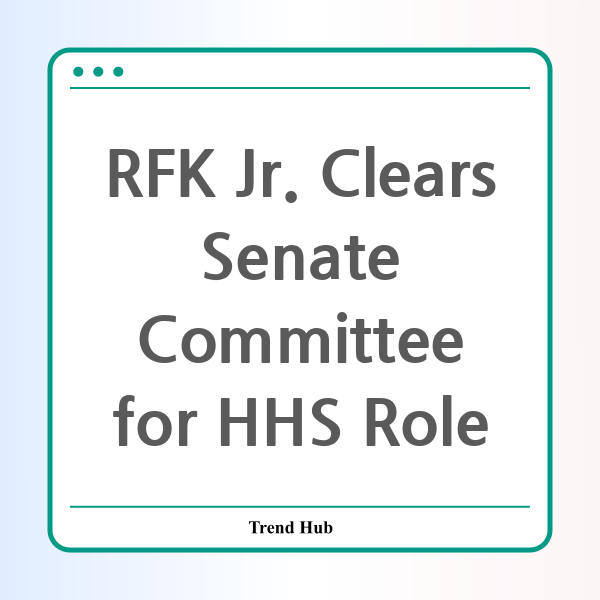* This website participates in the Amazon Affiliate Program and earns from qualifying purchases.

Is Robert F. Kennedy Jr. the Right Choice for HHS?
In a significant political move, Robert F. Kennedy Jr. has successfully advanced through the Senate Finance Committee, taking a crucial step toward potentially becoming the next Secretary of Health and Human Services under Donald Trump’s administration. His nomination has stirred a mix of support and skepticism, especially given his controversial views on vaccines and public health.
Kennedy, an environmental advocate and vaccine skeptic, previously ran as a candidate in the 2024 presidential race but stepped back to endorse Trump. As the Senate Finance Committee—a bipartisan panel made up of 14 Republicans and 13 Democrats—voted along party lines with a narrow 14-13 outcome, Kennedy's nomination reflects the divided landscape of American politics.
During the Senate hearings, Kennedy's past as the founder and head of Children’s Health Defense was scrutinized. This nonprofit organization, which has taken legal action against vaccine mandates and the federal government itself, has placed Kennedy at the center of heated debates regarding public health policy. Critics have expressed concerns about his stance on vaccines, which they argue could compromise public health efforts, especially concerning children.
Despite expected opposition from Democrats, one of the crucial endorsements came from Senator Bill Cassidy, the chair of the Senate Health Committee. His support was pivotal in ensuring that the committee vote swung in favor of Kennedy at this stage. With a Republican majority in the Senate, Kennedy can lose the backing of only three GOP senators if Democrats align against him during the final vote.
Kennedy has articulated a vision for the Health and Human Services department that emphasizes promoting healthier lifestyles and revamping dietary guidelines. His proposals aim to tackle issues associated with ultra-processed foods and address chronic health conditions from their root causes. This focus aligns with a growing concern among health officials about diet-related diseases in America, making his approach potentially resonant with certain constituencies.
The contrasting views within the Senate highlight a broader conversation about health policy in America. On one hand, Kennedy advocates for deregulation and a return to more individual choice in health matters; on the other, many believe that his views may undermine established medical practices and public health strategies.
As Kennedy's nomination moves forward, the next steps will determine not only his fate but also the direction of health policy in the United States. The final Senate vote will be a critical moment, not just for Kennedy, but for the broader implications of his leadership style and health priorities if confirmed.
This unfolding drama reflects the intersection of politics, public health, and individual freedoms in the United States and raises essential questions about the future of health governance in the country. Will Kennedy’s controversial views resonate with Senate Republicans and the public as he continues his journey toward a pivotal cabinet position? Only time will tell.
* This website participates in the Amazon Affiliate Program and earns from qualifying purchases.